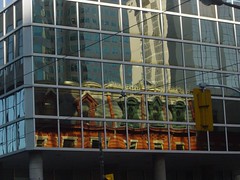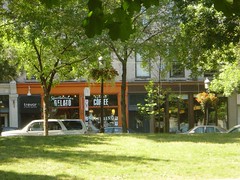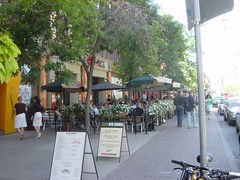It’s a unique experience. I have flown to an exotic place, not home, to join my family. Brenda and Martin flew to Boston yesterday to enjoy day one of a short vacation in this revolutionary city. They visited Bunkerhill, and attended a concert of the Boston Pops last night, probably the high point for Martin — who was downloading music from Carousel shortly after arriving back at the hotel.
So this morning, I wake up on Boston Harbor, with the masts of the USS Constitution rising up over a contemporary office building, next to the hotel. Later this morning we’ll walk the Freedom Trail, do some shopping, and probably enjoy some seafood (not fried). None of us have visited Boston as a vacation, so this promises to be fun.
Yesterday for me was not a total loss. Quite the contrary. It was absolutely one of the most professionally rewarding days of my career. Ontario’s provincial Ministry of Education has challenged the Ontario Library Association to write a new guiding document for school libraries. They are providing a grant for selected writers to compose a blueprint for the 21st century library, and they are explicitly asking that this document be something that will not only influence school media centers, but reach into every classroom and transform teaching and learning in the entire province.
So picture this. I’m in a conference room, sitting at a board table with some really smart people, who talk a lot like me — except for Ross Todd from New Jersey, who actually grew up in Australia. Outside is a city of heritage, with enormous modern buildings of glass, parks, and sidewalk cafes. And we’re asked to brainstorm about the library of the future.
I can not remember all of the high points of the day, but one that stands out was an initial statement made by a fellow named Ray (so very sorry I do not recall all of the names. If I receive a list of all of the participants, I’ll post it.) He asked why there were no students in the group. A very important question, which actually inserted itself into nearly every other conversation of the day.
One of the driving forces of this document, I suspect, will be the patron. This is not to say that current school libraries in Ontario and across Canada and the U.S. are not focused on the patron. They most certainly are designed and worked to serve patrons. However, what today’s libraries should become is a place where the patron is empowered to make the library experience personal, to almost literally make that experience, redesign the library to be, exactly what they need it to be. You want a library were, by the end of the school year, each student can conduct a tour of the facility and that each tour would be absolutely different.
Another idea that came up, was from Esther Rosenfeld, the project’s lead writer. She talked about a time when, if the history teacher did not get through World War II (in the U.S. it would be the Civil War), then that was OK. Now, teachers are pressured to get through the entire curriculum, to the end of the textbook, covering every chapter. What would a library look like that became the place where it was alright not to get past World War II — where students can linger and indulge in learning.
So much more to say, but it is now time for vacation. I will mention that the ears of Doug Johnson and Joyce Valenza must have been on fire!

 Actually applying tags can be quirky and dependent on the blogging engine that you use. This is why I made a little tool a couple of years ago to help. It’s called Blog Tag Generator (took me a long time to think that one up). To run BTG, go to the front page of my
Actually applying tags can be quirky and dependent on the blogging engine that you use. This is why I made a little tool a couple of years ago to help. It’s called Blog Tag Generator (took me a long time to think that one up). To run BTG, go to the front page of my  So, according to the
So, according to the 


 Yesterday’s blog sparked some very rich comments about the nature of information. I was reminded of much that I have read and thought about, and alot that I haven’t. I am seriously flatter to have earned a comment from David Thornburg. ..and I am always thrilled to see Tom Hoffman weigh in.
Yesterday’s blog sparked some very rich comments about the nature of information. I was reminded of much that I have read and thought about, and alot that I haven’t. I am seriously flatter to have earned a comment from David Thornburg. ..and I am always thrilled to see Tom Hoffman weigh in.